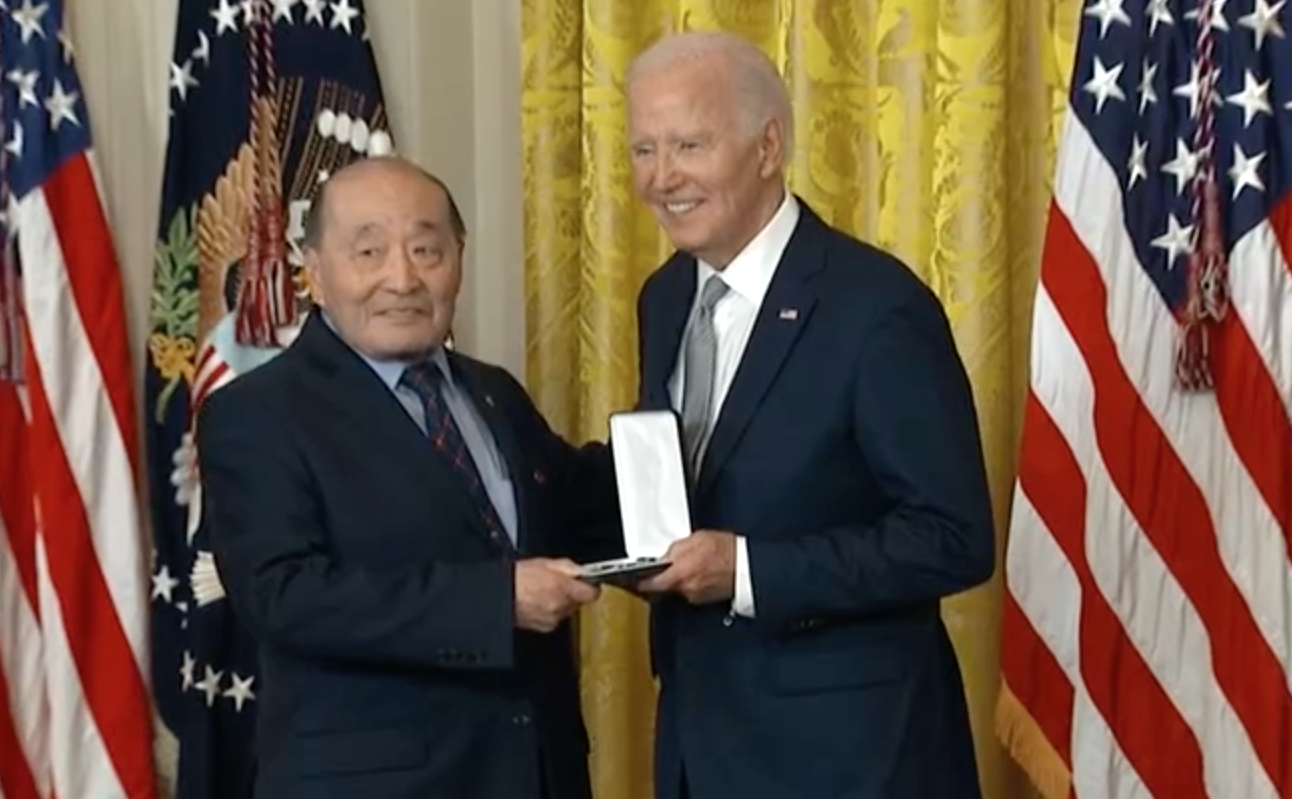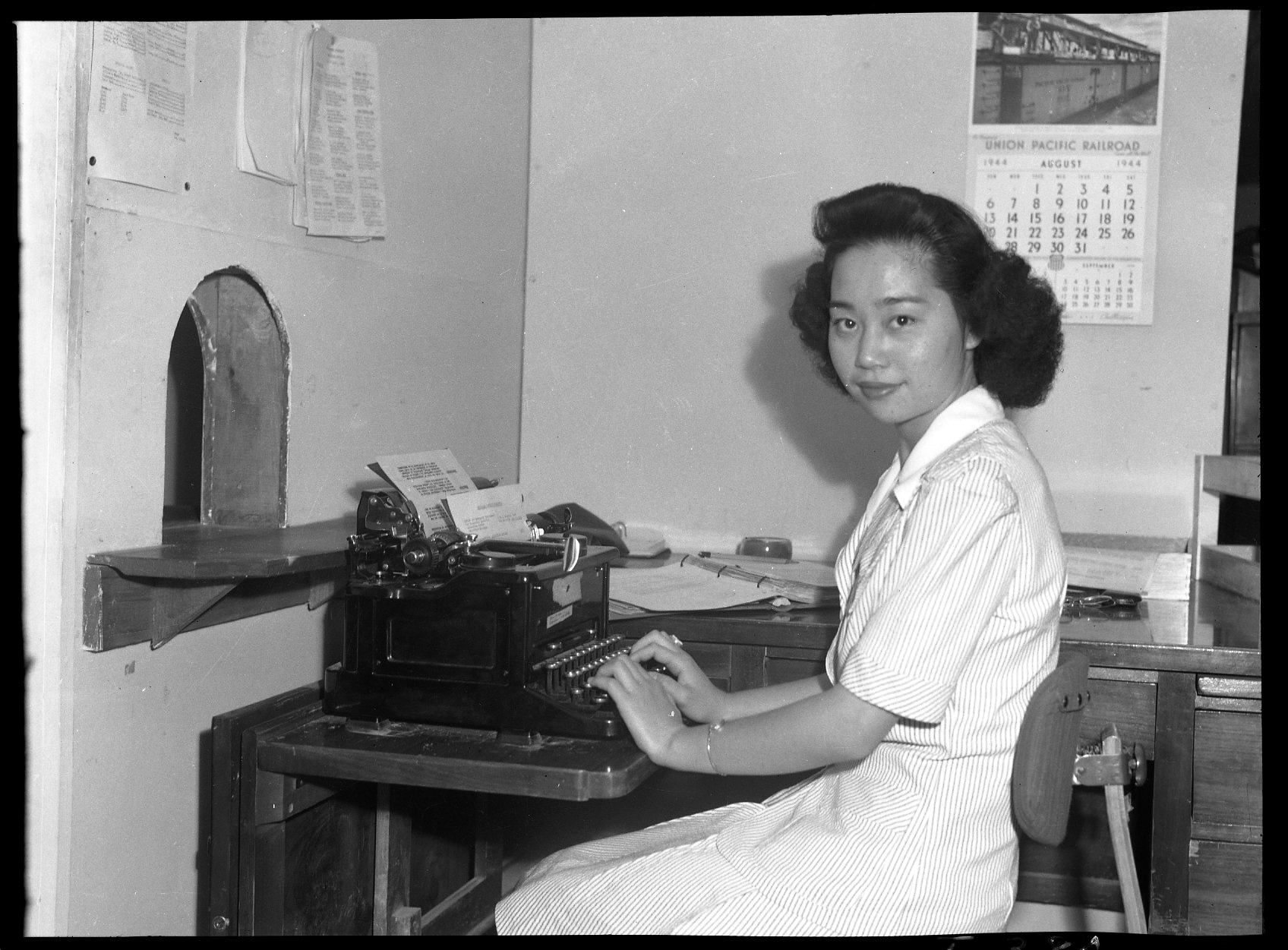
Wayne Tsutsumi accepts the Presidential Citizens Medal on behalf of his late mother, Mitsuye Endo Tsutsumi, from President Biden at the White House on Jan. 2.
JACL hails the announcement; organization backed her Supreme Court case in 1944.
By George Toshio Johnston, Senior Editor
WASHINGTON — The White House announced that the late Mitsuye Endo Tsutsumi was among the 20 individuals who received the Presidential Citizens Medal on Jan. 2. Accepting the medal on behalf of his mother was Wayne Tsutsumi.
The Presidential Citizens Medal is given out to those “who have performed exemplary deeds of service for their country or their fellow citizens.”
In its statement, the White House gave the following reason for the selection of Tsutsumi, née Endo: “In a shameful chapter in our Nation’s history, Mitsuye Endo was incarcerated alongside more than 120,000 Japanese Americans. Undaunted, she challenged the injustice and reached the Supreme Court. Her resolve allowed thousands of Japanese Americans to return home and rebuild their lives, reminding us that we are a Nation that stands for freedom for all.”
Originally from Sacramento, Calif., Endo had been employed as a clerical worker for the California Department of Motor Vehicles when Japan attacked Pearl Harbor, Hawaii, on Dec. 7, 1941. Like all the other Japanese Americans employed by the state, Endo was fired soon thereafter, and would be incarcerated at War Relocation Authority camps, first at Tule Lake in California, then at Topaz in Utah.
The Supreme Court case Ex parte Endo, 323 U.S. 283 (1944) was one of four Supreme Court challenges filed by Japanese Americans during World War II, when ethnic Japanese living along the West Coast of the United States, the majority of whom were American citizens, were rounded up, removed from their homes and incarcerated en masse in 10 government-operated concentration camps operated by the War Relocation Authority following President Roosevelt’s Executive Order 9066.
In addition to Endo’s case, the other three high court challenges were Korematsu v. United States, Hirabayashi v. United States and Yasui v. United States, filed by Fred Korematsu, Gordon Hirabayashi and Minoru Yasui.

Mitsuye Endo in 1944 (Photo: National Archives)
A Nisei, Endo’s case was the sole SCOTUS case among the four that resulted in a legal victory, on Dec. 18, 1944. According to the Densho Encyclopedia, “ … the United States Supreme Court held unanimously that the federal government could not confine indefinitely U.S. citizens of Japanese ancestry who were ‘concededly loyal’ in War Relocation Authority (WRA) camps. … News of the Supreme Court’s ruling led the U.S. War Department, with the consent of President Franklin D. Roosevelt, to announce the lifting of Japanese American exclusion from the West Coast, and thereby made possible the winding down of the WRA camps.”
Although media-shy, Endo was nevertheless interviewed in John Tateishi’s 1984 book “And Justice for All: An Oral History of the Japanese American Detention Camps.”
Speaking with Tateishi, whose résumé includes serving as JACL’s national redress director, as well as JACL national director, Endo said, “Actually I didn’t do too much. It was all my attorney’s effort,” a reference to James Purcell, a San Francisco attorney hired by JACL over what it believed was the wrongful termination of Endo and 61 other Japanese Americans who had been employed by the State of California.
Believing that mass incarceration of American citizens without due process violated the Constitution, Purcell saw Endo as an ideal plaintiff because of her background: She was a Christian, she neither spoke nor read Japanese, had never been to Japan and her brother was serving in the U.S. military.
The resolve that Biden referred to was in reference to Endo’s personal decision. She could have left Topaz when the government offered to release her to join her sister in Chicago — if she dropped her case. Instead, she endured living in camp for two more years until the high court ruled in her favor.
Endo told Tateishi, “It was through the state of California employees and the JACL that we got together on this thing.” In its statement, the Japanese American Citizens League said: “As it was with JACL’s urging that Endo brought forth her case, we have long advocated for presidential recognition of Endo for her actions, including passing a national council resolution in 2014. We thank President Biden for acknowledging and recognizing such a monumental case and the woman behind it all.”
“When I think about it now — that my case went to the United Sates Supreme Court — I’m awed by it,” Endo also told Tateishi.
Endo eventually did move to Chicago, where she met her husband and raised their three children. She died in 2006. She was inducted into the California Hall of Fame in 2024.
“Do I have any regrets at all about the test case? No, not now, because of the way it turned out,” Endo told Tateishi.
A video about Endo and her case can be viewed at youtube.com/watch?v=YPB5KOuUTX0.
Going back to the Obama administration in the runup to Biden bestowing the Presidential Citizens Medal to her, there had been efforts to have Endo receive the Presidential Medal of Freedom, which have been awarded to Korematsu, Hirabayashi and Yasui.
The 19 others who also received the Presidential Citizens Medal with Endo were Mary L. Bonauto, Bill Bradley, Frank K. Butler Jr., Elizabeth L. Cheney, Christopher J. Dodd, Diane Carlson Evans, Joseph L. Galloway, Nancy Landon Kassebaum, Ted Kaufman, Carolyn McCarthy, Louis Lorenzo Redding, Bobby Sager, Collins J. Seitz, Eleanor Smeal, Bennie G. Thompson, Thomas J. Vallely, Frances M. Visco, Paula S. Wallace and Evan Wolfson.
The JACL’s statement may be read here.



